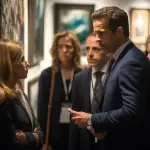In a surprising turn of events, the White House press briefing room might be getting some new guests. Discussions have emerged about inviting independent journalists and podcast hosts to join the press corps, a move that could significantly alter how news is reported. This proposal has been driven by frustrations over perceived media bias, particularly regarding how certain major outlets seem to cater to Democratic narratives. It raises the question: why not open the floor to voices that have larger audiences and diverse perspectives?
The current state of play in the press room often feels like a one-act play, where only a few voices are allowed to ask the tough questions. Peter Doocy and Jacqui Heinrich have been notable for challenging the press secretary. However, a broader range of questions is necessary to hold leaders accountable and ensure transparency. With modern technology allowing for remote participation, why not add some new chairs for popular figures, like Joe Rogan or Megyn Kelly? After all, these hosts could ask the hard-hitting questions that leave politicians squirming in their seats.
The comparison of media access during previous campaigns is eye-opening. While Donald Trump was often criticized, his media interactions provided a stark contrast to the current administration’s approach. The historical context suggests that Vice President Kamala Harris has been less available to the public than her predecessors. Her first solo TV interview took an astonishing 38 days after launching her campaign. This lack of accessibility sharply contrasts with Trump’s media strategies, where he was seen virtually everywhere.
In recent critiques of Harris’s campaign strategy, some voices noted a disconnect between what voters needed to hear and the questions being asked. The idea isn’t just about what questions get asked but about who is asking them. Critics argue that the campaign team’s decisions on media interactions have shown a lack of understanding of the current political landscape. Harris’s campaign blew through substantial funds and still ended up in debt, suggesting a need for drastic changes in strategy.
Meanwhile, on the celebrity front, comments made by actress Sharon Stone didn’t exactly win her any friends among conservatives. She implied that Americans lack culture and are largely uneducated, which highlights a common narrative among Hollywood elites who often seem disconnected from the rest of the nation. This kind of rhetoric doesn’t resonate well, especially when the average American is trying to navigate daily life amidst rising costs and economic challenges.
All of this points to a crucial moment in American media and politics. The initiative to open up the press room could not only diversify the questions being asked but might also provide the accountability that the public deserves. As the landscape evolves, it will be interesting to see if these changes take root and how they impact the future of political discourse in America.




